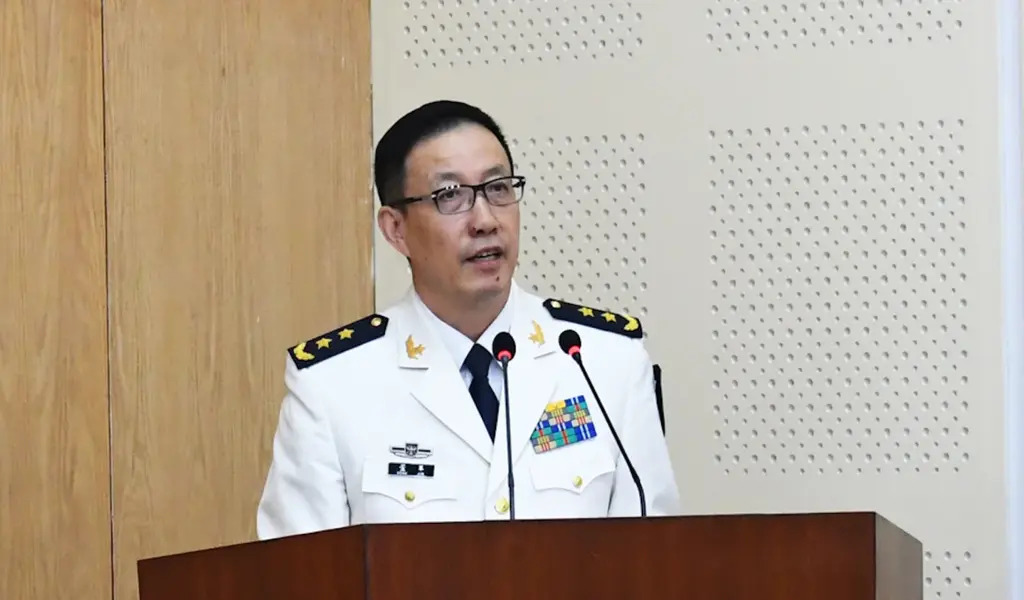(CTN News) – China has appointed former naval commander Dong Jun as the new defense minister, replacing Li Shangfu, who was removed from the role two months ago without explanation following an extended absence from public view.
The National People’s Congress (NPC), China’s top legislative body, announced Dong’s appointment during its final session of the year, according to state media Xinhua.
The NPC also disclosed the removal of nine military figures from their positions, without providing reasons for the sweeping changes. T
his move follows a series of recent military personnel shake-ups. Dong Jun, who served as the top commander of the Chinese People’s Liberation Army (PLA) Navy since 2021, fills the vacancy left by Li’s removal in October.
Li Shangfu, appointed defense minister in March, had not been seen in public since late August, leading to widespread speculation about his fate.
His removal was part of a broader pattern of unexplained personnel changes, including the dramatic ousting of former Foreign Minister Qin Gang in July and the removal of two leaders from the PLA’s Rocket Force.
Both Li and Qin assumed their roles earlier in the year, hand-picked by Chinese leader Xi Jinping as part of his efforts to consolidate power and appoint loyalists to key positions.
These abrupt dismissals have raised concerns about the transparency of Xi’s governance and his consolidation of power within China’s political system.
Speculation Surrounds Purge in Chinese Military as Nine PLA Figures Removed from NPC Delegates
The removal of the nine People’s Liberation Army (PLA) figures as delegates to the National People’s Congress (NPC) is expected to spark speculation about a broader purge within the military.
This move aligns with Xi Jinping’s ongoing ten-year campaign to combat corruption within the ranks.
While the NPC is primarily considered a symbolic parliament, being appointed as a delegate signifies endorsement of one’s political elite status. Past instances have seen NPC delegates stripped of their positions due to corruption investigations.
Among those removed is Li Yuchao, the former chief of the Rocket Force, who lost his post in July, along with four other officials currently or formerly associated with the branch.
Two dismissals are linked to the Equipment Development Department, which recently announced an anti-corruption initiative. Two others have affiliations with the Air Force and the Navy, according to Xinhua.
Three of the dismissed officials hold the rank of generals, while four are lieutenant generals.
The shake-up also seems to have affected the military-industrial complex, as three executives from the aerospace sector had their positions in the country’s top political advisory body revoked earlier in the week, as reported by Xinhua.
Before Li, the former defense minister, disappeared from public view, Xi held a meeting in Beijing with the military’s top brass, emphasizing political loyalty, discipline, and the party’s “absolute leadership” over the armed forces.
In July, the PLA’s Equipment Development Department announced a new crackdown on corrupt procurement practices, coinciding with Li’s tenure as its head.
Despite these developments, the Chinese government has not provided information on any investigations, and none of the ousted officials have been publicly named in corruption allegations.
The whereabouts and reasons for Li’s absence remain undisclosed, with the Chinese government refusing to comment. The announcement on Friday did not offer additional details, only confirming Dong’s appointment.
Reports from The Wall Street Journal suggest that Li was taken away for questioning by authorities in September, according to a source close to Beijing’s decision-making.
The Financial Times also reported that the U.S. government believes the defense minister is under investigation, citing American officials, although the reasons for the investigation are not specified in either report.
China’s New Naval Commander and Diplomatic Implications
In 2021, the newly appointed minister, Dong, assumed the position of the top commander of the Chinese People’s Liberation Army (PLA) Navy.
During a ceremony on Monday, former submarine commander Hu Zhongming was announced as his successor, being promoted to the rank of admiral.
Dong was observed at the event, seated in the front row, as shown in a video broadcast by state media.
Before taking command of the navy, Dong served as the deputy commander of the PLA’s Southern Theatre Command, responsible for overseeing operations in the South China Sea.
Under Xi’s leadership, Beijing has displayed increased assertiveness in the contested and strategically vital South China Sea.
The region has witnessed militarization of islands and the use of the expanding Chinese navy to reinforce its influence, despite rival claims from several Southeast Asian nations.
The role of the defense minister in China is largely ceremonial, serving as the public face of military diplomacy with other nations.
Unlike counterparts such as the U.S. defense secretary, the Chinese defense minister lacks direct command power, which resides with the Central Military Commission. Nevertheless, the defense minister traditionally holds a position on the commission.
Despite its ceremonial nature, the defense minister plays a crucial role in China’s military diplomacy. The appointment of Dong could potentially facilitate the ongoing restoration of high-level defense dialogue between the U.S. and China.
Recently, top U.S. and Chinese generals engaged in their first conversation in over a year, signaling the end of a strained period of silence between senior military officials from both nations.
China had severed communication in August 2022, following a visit to Taiwan by then-House Speaker Nancy Pelosi, an island that Beijing’s ruling Communist Party claims, despite never having controlled it.
In 2018, the U.S. imposed sanctions on China’s former defense minister, Li, over China’s acquisition of Russian weapons. Beijing had consistently suggested that a meeting between U.S. Defense Secretary Lloyd Austin and Li would not occur unless the sanctions were lifted.







